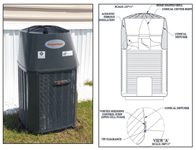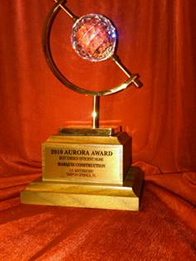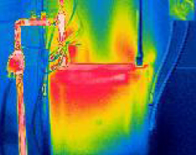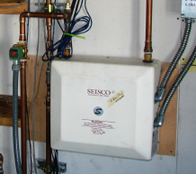|
FSEC selected by DOE for Advanced Energy-Efficient Building Technologies
On June 17, 2010, DOE announced that three FSEC projects will be funded to improve building efficiency: |
Variable Refrigerant Flow Systems
FSEC’s Rich Raustad and Lixing Gu will lead development of Energy Plus models for variable refrigerant flow heat pump and heat recovery systems. These systems are gaining popularity in the U.S. and are highly popular in Japan. FSEC will work with four manufacturers and EPRI to develop and validate the model for DOE’s flagship building simulation program, Energy Plus. |
Improving the Best Air Conditioner Technology
FSEC’s John Sherwin and Danny Parker will run experiments to improve the performance of residential air conditioning systems through improving the fan efficiency and providing evaporative cooling to the condenser. The goal is to take the top-of-the line 20+ SEER systems and have them approach 30 SEER systems. |
Development of an Integrated Simulation for Performance-Based Design of Very-Low Energy & High IEQ Buildings
FSEC’s Lixing Gu will lead FSEC’s subcontract from Syracuse University to develop a “Virtual Design Studio.” The knowledge-based expert system integrates a suite of performance simulation models, a “virtual building” database, and a knowledge base of architectural design principles to help achieve a fully coordinated, integrated, and optimized building design. |
Twelve Aurora Awards Presented to BAIHP Partners
Twelve Auroras, including three Grand Auroras and the Judges Choice Award, were presented to current and past BAIHP partners at the 2010 Southeast Building Conference (SEBC) on July 24, 2010 in Orlando, Florida. Read more about the projects that received awards and the BAIHP partnerships.
More |
FSEC to Expand Training Program
DOE announced that FSEC was competitively selected to receive a $482,000 contact under the American Recovery and Reinvestment Act to expand FSEC’s weatherization training program. New courses will integrate Florida-specific weatherization protocols into DOE-standardized weatherization training curricula, enrich learning and allow increased hands-on testing and measurements.
More |
|
Side-by-Side Testing of Water Heating Systems:
Results from the 2009-2010 Evaluation
This report unveils the energy efficiency performance results of seven water heating systems tested side-by-side. Measured efficiencies varied seasonally due to water inlet mains temperatures and draw patterns. The study concluded that a solar water heating system can provide over 61.2 % of electricity savings as compared to a standard electric 50-gallon heater on a typical family draw pattern. A natural gas tankless water heater demonstrated a 26.9% gas savings as compared to a standard 40-gallon upright vented heater.
Publication |
Field Monitoring and Hourly Simulation of Energy and Demand Savings from Use of the Telkonet SS5000 System Hotel HAC Occupancy Control
A study of heating and cooling energy savings was performed by FSEC at the request of Florida Power and Light (FPL). Air conditioning and heating control systems were installed in a 56-room hotel in Central Florida. Thermostat setpoints in half of the rooms were adjusted when the room was detected to be unoccupied. Heating and cooling energy use was monitored for a period of 9.5 months. Energy and demand savings were analyzed.
Publication |
|
Energy Code and Energy Rater Training Available!
There's still time to be trained on learning software, classroom and diagnostic training for becoming an energy rater, and blueprints for code purposes. Limited room!
Enroll Now |
Fall 2010 Courses
FSEC offers a wide range of courses covering renewable energy and building energy technology topics. Most include both classroom instruction and hands-on field experience. In many cases, attendees can receive CEU credits and some courses are approved for Florida professional license renewals.
View FSEC's Course Schedule |






